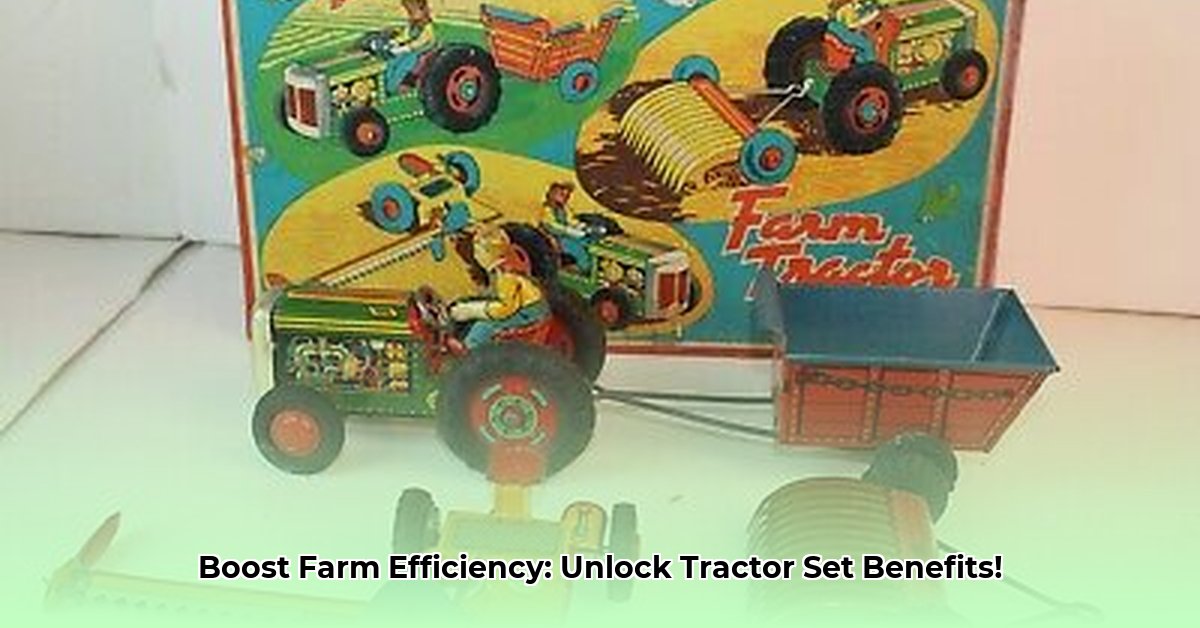
Farm Tractor Sets: The Key to Sustainable Agricultural Efficiency
Modern farming demands efficiency and sustainability. A well-chosen farm tractor set is paramount to achieving both. This guide will equip you with the knowledge to select, operate, and maintain a tractor set that optimizes your farm's productivity while minimizing environmental impact. We'll explore crucial aspects, from fuel efficiency to advanced farming techniques. For more information on sub-compact tractors, check out this helpful resource.
Choosing the Right Tractor: Matching Needs to Capabilities
Selecting the right tractor is crucial for maximizing efficiency and return on investment (ROI). Consider these factors:
- Farm Size and Terrain: A smaller tractor is ideal for navigating tight spaces, while a larger, more powerful model suits expansive fields. Consider soil type and potential obstacles.
- Primary Farming Activities: What tasks will the tractor perform most frequently? (e.g., plowing, planting, harvesting). This dictates implement needs.
- Horsepower Requirements: Insufficient power leads to inefficiency; excessive power wastes fuel. Consult your local equipment dealer to determine the optimal horsepower for your operations.
Remember: a local equipment dealer provides invaluable expertise in matching your farm's specific needs to available models. Don't hesitate to ask questions!
Essential Tractor Implements: Expanding Operational Capabilities
The tractor itself is just the foundation. Essential implements unlock its full potential, transforming it from a powerful engine to a versatile farming machine. Consider these:
- Plows: Prepare fields for planting by turning over the soil.
- Planters: Efficiently plant seeds, optimizing seed spacing and depth.
- Cultivators: Control weeds, reducing competition for resources and ensuring healthy crop growth.
- Harvesters/Combines: Efficiently harvest crops, minimizing losses and maximizing yield.
- Sprayers: Manage pests and diseases effectively, protecting crops and improving yields.
Selecting the right implements depends entirely on your crops and farming practices. Careful consideration will enhance operational efficiency and profitability.
"Investing in the correct implements is crucial for maximizing the return on your tractor investment," says Dr. Emily Carter, Agricultural Engineering Professor at Purdue University.
Maintaining Your Tractor Set: Preventative Maintenance for Peak Performance
Regular maintenance is vital for prolonging the lifespan of your equipment and preventing costly repairs. It’s an investment that pays off in reliable performance and long-term cost savings. Implement this three-step preventative strategy:
- Regular Inspections (Daily): Conduct a thorough visual inspection before each use. Check for loose parts, leaks, unusual noises, and any signs of damage. Addressing minor issues early prevents them from escalating into major problems.
- Scheduled Servicing (Manufacturer’s Recommendation): Adhere strictly to the manufacturer's recommended service schedule for oil changes, filter replacements, and other routine maintenance tasks. This ensures optimal engine performance and extends the tractor's lifespan.
- Proper Storage (Seasonal): Store your tractor and implements in a dry, sheltered location to protect them from the elements, significantly extending their longevity.
Does regular maintenance seem like extra work? Consider the cost of a major breakdown versus the relatively small cost of preventative care. The choice is obvious.
Fuel Efficiency and Environmental Sustainability: Modern Tractors' Green Credentials
Modern tractors incorporate advanced technologies that enhance fuel efficiency and reduce environmental impact. Features like advanced engine management systems, optimized fuel injection, and smart power management systems significantly lessen fuel consumption.
"Modern tractors are designed to minimize fuel consumption while maximizing performance," explains John Miller, Chief Engineer at AgriTech Solutions.
This results in significant cost savings and reduced carbon emissions. Choosing fuel-efficient models contributes to environmentally responsible farming practices.
Safety First: Responsible Operation and Risk Mitigation
Safety is paramount when operating farm machinery. Always adhere to the manufacturer's safety guidelines. Never operate equipment when fatigued or under the influence of substances that impair judgment. Appropriate safety gear, including protective clothing, eyewear, and hearing protection, is essential for personal safety. Proper training is also critical for safe operation.
Key Takeaways:
- Prioritize regular maintenance to prevent costly downtime.
- Select implements to match your specific needs and crop type.
- Fuel-efficient tractors are key for sustainability and cost savings.
The initial investment in a farm tractor set is substantial, but the long-term benefits—enhanced efficiency, reduced labor costs, and increased yields—make it a sound investment for sustainable agricultural practices. Remember to prioritize safety and maintenance for long-term success.